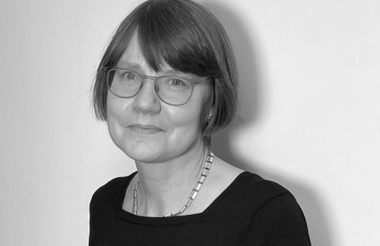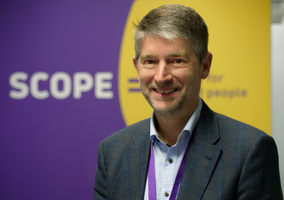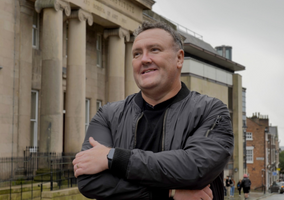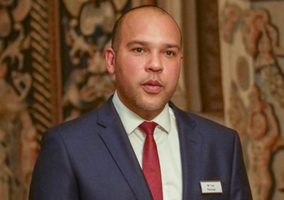Ros Oakley is set to leave the Association of Chairs (AoC) on 30 November, having co-founded the membership organisation 10 years ago.
“It’s an interesting set of emotions, because obviously, I’ve been there a long time,” she shares, “but I think AoC is ready for a new chapter.”
She says co-founding the organisation was “quite a journey”.
“You have to be very entrepreneurial, bring a lot of energy. Be very flexible and committed, and definitely work to bring other people on board with you.”
In the immediate future, Oakley plans to “recharge a little bit, give myself a bit of space”.
“It’s been quite intense, running a small charity particularly for the last few years, and then I fully intend to be back in the sector,” she says.
‘A lot of burden is falling on the shoulders of chairs’
On the reasons for setting up the AoC, Oakley says: “People talk a lot about the loneliness of chief executives, but not so much about the loneliness of chairs.
“When you stop and think about it, chief executives are paid to do that, and chairs are doing this part time, voluntarily. So, there was a really clear need to support chairs.”
Oakley says another reason for the organisation was the difference between being a chair and a trustee.
“I was a trustee and then when I stepped up to be chair, I just found the change was immense. Because although in legal terms chairs don’t have any additional responsibility, in practical terms they really do.
“One of the things chairs need to do is to create a team out of this disparate set of trustees who meet maybe only for 18 hours a year. If you think about trying to create good working relationships and getting people on the same page in that kind of timeframe, it’s a really challenging role.”
There is also an interesting dynamic between chairs and chief executives, Oakley says, as the CEO who is paid to be there “might have deeper knowledge” of the charity “so it’s how you get the balance right”.
“Chairs have to be giving the chief executive enough space to make the most of their abilities, but also holding them to account, which you have to do because it’s the trustee board that’s legally responsible,” she says.
The Covid-19 pandemic and as the cost-of-living crisis have added more pressure to chairs, says Oakley, particularly those of smaller charities.
“Chief executives are feeling it, but so too are chairs, and it’s worth making the point of course that 80% of charities have no staff. So, a lot of that burden is falling on the shoulders of chairs.”
‘We don’t seem to have a culture of valuing infrastructure’
One of AoC’s challenges, Oakley says, is that many charities do not have a budget for supporting their chair.
“We find that around 50% of our members pay for membership themselves, which I think is something we need to change.
“It’s a challenge in the current time when money is tight to get charities to invest in membership support for chairs, but also in staff.
“I know this from other infrastructure bodies, that it can be a challenge to bring in sufficient membership income. We don’t seem on the whole to have a culture of valuing infrastructure support and the development of the people in our sector.
“I think we’re often very focused on the end goal, and there’s not enough investment in the people and processes and systems that may make it work.
“You’ve got that constant balancing act between your charitable purpose and your drive and your values wanting to give things away, but the need for a sustainable business model.
“The way that we’ve tried to tackle that at AoC is that we simply want to grow the number of people who join AoC, so that we can keep fees low but keep growing the size. But it’s tricky. I think if you talk to any infrastructure body, trying to find a sustainable business model is really challenging.”
Oakley notes 360 Giving published research earlier in the year about funding to infrastructure bodies, which reported that they were operating in “a very fragile ecosystem”.
“I think what was striking about that is how small the number of funders are who are willing to support infrastructure,” she says.
“It’s right to acknowledge that some funders have done a great job, but many of the programmes are structured, and I find this when I write grant applications, are all geared towards the front line. And just some slight, quite small tweaks could enable more infrastructure to benefit.”
‘People are more aware of diversity but less about inclusion’
Oakley says: “I think there’s definitely too much homogeneity in boards and the Charity Commission research, Taken on Trust, really underlined that.
“We very much share with our members the importance of thinking about and acting on equity, diversity and inclusion.
“I think quite a lot of people are more aware of diversity but less about inclusion. So I think there’s quite a lot of focus on ‘do we have visible diversity on our board’ and the sense ‘we just need to change the people on the board and everything will change’, whereas actually tackling these long established issues of inequality takes time and they are about unlearning things.
“It’s as much about culture and how we think, and what’s embedded, that those of us who benefit from the current system aren’t even aware of.
“Certainly in our conversations with chairs they’ve often had to provide a leadership role to others in holding the space to have difficult conversations and to explore things that can be quite painful actually.
“It’s never good to come to the realisation that we might inadvertently have been part of the problem, and that there were things that we’re doing that get in the way.
“I think there’s a lot more awareness of the importance of this issue. We are making progress, but I think there’s a long way to go.
“We often say to people, try and make sure you recruit two or three trustees at a time and don’t expect an individual to be the person who carries the EDI brief or represents all people – it needs to be more nuanced than that.
“I think different charities take different approaches to lived experience. Absolutely the voice of the people you’re there to serve has to be front and centre. In some cases, that’s via lived experience on the board.
“I think one challenge around that is to make sure that again, you’re not relying on one or two people to represent the totality of your user base. And it is about it being absolutely baked into the charity that you are led by users’ needs, views and experiences. But certainly, users on the board really add value.”
‘It’s really rewarding, but it’s hard work’
Asked what people should expect on applying for a chair role, Oakley advises: “Being a chair is really rewarding but it’s hard work.
“I think it’s important to go into it with the right mindset and with the right motivations. Occasionally you’ll get a chair who has become chair because they think it’s a status thing. It’s important people understand it’s a really important leadership role. So they need to be willing and ready to take on leadership responsibility. I would say be ready to learn, bring humility.”
Other important qualities for a chair are a willingness to listen, and ability to get on with people, she says.
“If you choose to be a chair, make sure you talk to the charity about how much time is really required,” Oakley says.
“People can go in with quite unrealistic expectations and the reality is, it can be a lot of time, particularly if things change in the charity.”
Oakley says CEOs also have a responsibility to support their chairs.
“I would say particularly to chief executives, value the role of chair, put a lot of time into supporting the board when they’re looking for a new chair, and look at how you can support them.
“These are difficult roles. I sometimes hear criticism of chairs and that’s fair enough, none of us get everything perfect, but I think it’s unfair to expect perfection, particularly when you’re not supporting them. So be realistic in your expectations.
“If you want somebody to be good in the role of chair, what are you doing to support them?”
‘Every chair should have access to the support they need’
Oakley is proud of what AoC has achieved during her tenure with the resources at its disposal.
“10 years ago, we didn’t have anything at all and now we’ve got over 1,000 members and a really extensive events programme.
“We started out with a part time administrator and most of the time we’ve been at three or four members of staff. We also have freelancers who help us deliver some of our training and we do have volunteers who help us, particularly in delivering events. So, we deliver a lot with that.
“People do talk about chairs a lot more but it’s definitely not job done and we need more people talking about chairs supporting chairs.
“I often think they’re the Cinderellas in the sector. And we do need to change that.
“Our ambition is that every chair should have access to support they need to do the role well, and that in turn, leads to more effectiveness.”












